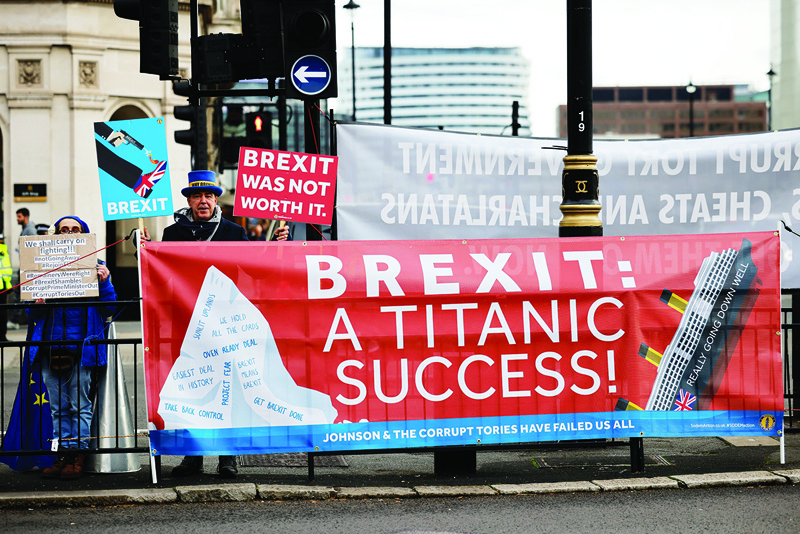
BRUSSELS: British and EU negotiators were closing in yesterday on a deal to oversee fair competition in a post-Brexit trade deal, but remained deeply divided over fishing. As intense talks continued in Brussels, European Commission President Ursula von der Leyen said "the next days are going to be decisive". Many supposed deadlines have already been missed, the EU chief admitted. But, with two weeks until Britain leaves the EU single market, time is finally running out.
In London, all eyes were on parliament's lower House of Commons, which will have to decide when to meet to vote through any trade agreement reached by EU negotiator Michel Barnier and UK counterpart David Frost. Britain left the European Union on January 31 and, if no trade deal is agreed before the end of the year, EU-UK trade will revert to bare-bones World Trade Organization rules.
In practice, this will mean a return to tariffs and quotas that will disrupt commerce and supply chains and drive up prices, a fate both sides say they want to avoid. But trade talks have stumbled over how to ensure fair competition between EU and UK businesses once London is free to diverge over time from Brussels' regulations. And there is a bitter dispute over fishing, which represents a tiny part of the economy but has taken on totemic political significance for several member states, and which the EU has linked to the broader trade deal.
Prime Minister Boris Johnson insists that when Britain leaves the EU single market at the end of the year it will resume full control over access to its waters. Some EU member states-led by France and the Netherlands-are holding out to preserve quotas for their crews in UK waters and a long-term arrangement to provide stability. Addressing the European Parliament, Von der Leyen said: "The good news is that we have found a way forward on most issues." She added that she and Barnier can now see a "narrow path to an agreement".
Very difficult
"But this is now a case of us being so close, and yet being so far away from each other, because two issues still remain outstanding, you know them: a level playing field and the fisheries," von der Leyen said. A UK official close to the talks confirmed that "we've made some progress, but we are still very far apart in key areas". Separately, ambassadors from EU member states approved a contingency plan to keep road and air traffic moving between Britain and the continent in the event of a "no deal".
This would allow trucks and planes to operate for an additional six months after January 1 -- but only if Britain agrees reciprocal terms. They also backed a plan to authorize fishing to continue-again on a reciprocal basis-until the end of 2021, but London has already said it will assume full sovereignty over its waters on January 1. The European Parliament is now expected to approve these plans on Friday.
Von der Leyen said that Barnier and Frost had made progress towards resolving rules for state aid to businesses and that questions over how the deal will be governed "are largely being resolved". She said Britain had agreed not to undercut the labor, social and environmental standards it already upholds under EU law. "That's a big step forward," she said. Now, however, the two sides must agree a mechanism to allow them to respond if standards diverge after Brexit.
Britain insists that it must be able to make its own laws in future and not necessarily follow new EU regulations. Brussels therefore wants a mechanism to impose penalties if this leaves EU firms at a disadvantage. On fishing, von der Leyen warned "the discussion is still very difficult". "We do not question the UK sovereignty on its own waters, but we asked for predictability and stability for our fishermen and our fisherwomen," she said. "And in all honesty, I sometimes feel that we will not be able to resolve this question." - AFP
.jpg)









